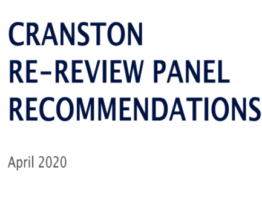
The Financial Conduct Authority (FCA) has fined Bank of Scotland (BOS) £45.5 million for failing to report its suspicions in relation to the Halifax Bank of Scotland (HBOS) Reading fraud during the period 3 May 2007 and 16 January 2009, when HBOS and BOS were formally acquired by Lloyds Banking Group (the Relevant Period).
The Final Notice issued by the FCA on 20 June 2019, concluded, amongst other matters, that:
- By 3 May 2007, BOS had identified suspicious conduct, including suspicions of fraud and, on a number of occasions during the Relevant Period, internal reports within BOS referred to the issues that had been identified as the ‘Reading Fraud’ (para 2.3).
- BOS was aware before its firm’s first communication with the FSA (the FCA’s predecessor) in May 2007 that the impact of its director, Lynden Scourfield’s, misconduct was significant and would result in substantial losses to BOS (para 2.9(2)). By June 2007, these losses had already been estimated at approximately £50 million and, by early 2008, they had increased to £265 million.
- On three occasions in 2007, BOS informed the FSA that it had found no evidence of fraud when “[i]n fact, BOS had identified suspicious conduct suggesting an inappropriate and potentially corrupt relationship” (para 2.6(2)).
- BOS had “numerous opportunities to inform the [FSA] about all the information it had identified suggesting that there may have been a fraud, but did not do so” (para 2.9(5)).
- BOS did not report its suspicions to any other law enforcement agency such as the police, despite BOS being contacted by two police forces in 2008 about allegations of fraud (para 2.9(7)).
- “If BOS had communicated its suspicions appropriately to the [FSA], as it should have done, the criminal misconduct could have been identified much earlier. This delay risked creating difficulties for TVP [Thames Valley Police] when obtaining and reviewing evidence years after the fraud had taken place and risked prejudicing the interests of justice” (para 2.9(7)).
- “Full disclosure of the issues within [HBOS Reading] would also have enabled the [FSA] at an earlier opportunity to properly assess BOS’s response to the identification of the issues, changes to its procedures, its approach to the complaints received from customers and consideration of any losses either to BOS or its customers…” (para 2.9(6)).
- Pursuant to Principle 11 of the FCA’s core principles for businesses, it is a fundamental obligation that a regulated firm must deal with its regulators in an open and cooperative way and disclose appropriately anything relating to the firm of which those regulators would reasonably expect notice. In addition, a specific rule (SUP 15.3.17R) requires a firm to notify the [FCA] immediately if the firm becomes aware that an employee may have committed a significant fraud against it.
- BOS’ breach was “particularly serious” and the FCA would have imposed a fine of £65 million, had BOS not “agreed to resolve this matter,” which qualified it for a 30% discount and a fine of £45.5 million.
The particular breach is categorised as: “On numerous occasions, over a period of nearly 1 year, BOS failed properly to understand and appreciate the significance of the information that it had identified despite clear warning signs that fraud might be involved. Whilst BOS did not intend to breach Principle 11, it failed to give proper consideration to the need to disclose the suspicious information that it had identified to the Authority.
“There was insufficient challenge, scrutiny or inquiry across the organisation; the totality of the information that had been identified was not properly evaluated; and there was no assessment or understanding of the impact that failing to give a full and complete picture to the Authority was likely to have…., nor is there any evidence anyone realised or thought that a failure to inform the Authority would delay investigation by relevant law enforcement authorities or prejudice the interests of justice.
“On any reasonable basis, BOS should have appreciated that it was required to inform the Authority fully about the information which raised suspicions that a significant fraud may have occurred and this failure constituted a substantial failure by BOS”.
The FCA also issued individual final notices against directors Lynden Scourfield, David Mills, Alison Mills and Mark Dobson, and banned them from working in financial services.
Click here for the announcement from the FCA.
Legal advice for victims of HBOS banking fraud
DS Law is a specialist in banking litigation and is one of the leading law firms representing victims of the fraud which occurred at the Reading-based Impaired Assets (IAR) team of Halifax Bank of Scotland.







Write a comment:
You must be logged in to post a comment.